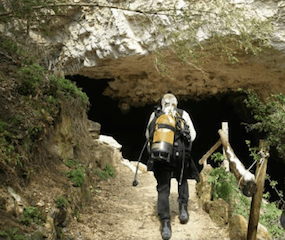Last Updated on May 11, 2021 by Dan
What is the best way to prepare for a cave diving excursion? The answer may be surprising. “Scuba Diving Tips for Cave Divers – Scuba tips best practices when exploring underwater caves.
You see, many people think that you need to spend months preparing before venturing into underwater caves. This couldn’t be further from the truth. In fact, there are several scuba diving tips that can help you dive into any environment with ease!
Before we get too deep into cave diving tips for beginner divers, it is important to understand what a cave diver actually does and how they go about their business… After going on over two dozen trips into aquatic caves around the world, I have seen firsthand just how rewarding this type of activity really is.
With proper training and preparation, it is possible for anyone (even those without experience) to explore these spectacular natural phenomena while preserving them simultaneously.
Here are the top scuba diving tips for beginner cave divers:
It is important to be aware of what you will need before making a dive. This includes but is not limited to, light sources, regulators, and buoyancy compensators (BC). Make sure your BC has an alternate air source as well as enough remaining gas so that you can safely make the return. You will also want to be mindful of your weighting and buoyancy at all times so that you don’t have any equipment issues while exploring underwater caves.
The most important thing for new divers is never panic, stay calm even if something unexpected happens or an emergency situation occurs; this way you ensure a safe and successful dive. Cave diving is as safe as any other scuba activity but requires an extra level of precaution and training, so always go in a group with experienced divers who know the area you’ll be exploring.
Another tip for new cave divers includes using your right hand to cover your left nostril while breathing through your mouth from now on because this will help equalize pressure more quickly–think about it like blowing up balloons when you were younger! You also want to make sure that one side of the regulator stays free at all times; this way there’s no chance of cross-contamination. If you’re not comfortable doing these things yet, don’t worry just remember them when it comes time for future dives and practice them beforehand too.
In terms of gear, you’ll need a standard diving mask as well as an air driven buoyancy compensator that doesn’t depend on your lungs. You’ll also want to use gloves and fins because it’s not unheard of for objects in the cave ceilings or walls to be sharp-edged–wearing protection is always better!
I hope these tips will help make your next scuba dive into a safe one with all necessary precautions taken care of ahead of time!
One final thing: caves are unpredictable environments, so never venture in alone and always have a backup plan for your exit in case the current becomes too strong.
You’ll find that caves offer some of the most memorable diving memories you can ever make!

